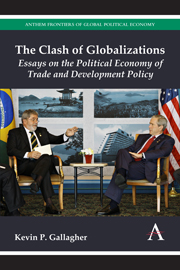Book contents
- Frontmatter
- Dedication
- Contents
- Preface and Acknowledgments
- List of Tables, Figures and Boxes
- Chapter 1 Introducing the Clash of Globalizations
- Chapter 2 Losing Control: Policy Space to Regulate Cross-Border Financial Flows
- Chapter 3 The New Vulture Culture: Sovereign Debt Restructuring and International Investment Rules
- Chapter 4 Whither the Developmental State? Industrial Policy and Development Sovereignty
- Chapter 5 Understanding Developing Country Resistance to the Doha Round
- Chapter 6 Trading Away the Ladder? Trade Politics and Economic Development in the Americas
- Chapter 7 Putting Development First: Trade Policy for the Twenty-first Century
- References
- Index
Chapter 4 - Whither the Developmental State? Industrial Policy and Development Sovereignty
Published online by Cambridge University Press: 05 September 2013
- Frontmatter
- Dedication
- Contents
- Preface and Acknowledgments
- List of Tables, Figures and Boxes
- Chapter 1 Introducing the Clash of Globalizations
- Chapter 2 Losing Control: Policy Space to Regulate Cross-Border Financial Flows
- Chapter 3 The New Vulture Culture: Sovereign Debt Restructuring and International Investment Rules
- Chapter 4 Whither the Developmental State? Industrial Policy and Development Sovereignty
- Chapter 5 Understanding Developing Country Resistance to the Doha Round
- Chapter 6 Trading Away the Ladder? Trade Politics and Economic Development in the Americas
- Chapter 7 Putting Development First: Trade Policy for the Twenty-first Century
- References
- Index
Summary
With Rachel Denae Thrasher
This chapter examines the extent to which the emerging world trading regime leaves nations the “policy space” to deploy effective policy for long-run diversification and development and the extent to which there is a convergence of such policy space under global and regional trade regimes. We examine the economic theory of trade and long-run growth and underscore the fact that traditional theories lose luster in the presence of the need for long-run dynamic comparative advantages and when market failures are rife. We then review a “toolbox” of policies that have been deployed by developed and developing countries past and present to kickstart diversity and development with the hope of achieving long-run growth. Next, we examine the extent to which rules under the World Trade Organization, trade agreements between the European Union and developing countries, trade agreements between the United States and developing countries, and those among developing countries (South–South, or S–S, agreements) allow for the use of such policies. We demonstrate that there is a great divergence among trade regimes over this question. While S–S agreements provide ample policy space for industrial development, the WTO and EU agreements largely represent the middle of the spectrum in terms of constraining policy space choices. On the far end, opposite S–S agreements, US agreements place considerably more constraints by binding parties both broadly and deeply in their trade commitments.
- Type
- Chapter
- Information
- The Clash of GlobalizationsEssays on the Political Economy of Trade and Development Policy, pp. 63 - 96Publisher: Anthem PressPrint publication year: 2013



